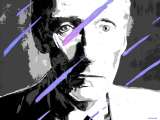 |
Old Bull Lee A Voice From the Reality-based Community Notes from a Study of Things Themselves |
 |
Who's in the Reality-based Community?
The aide [to George W. Bush] said that guys like me were "in what we call the reality-based community," which he defined as people who "believe that solutions emerge from your judicious study of discernible reality." I nodded and murmured something about enlightenment principles and empiricism. He cut me off. "That's not the way the world really works anymore," he continued. "We're an empire now, and when we act, we create our own reality. And while you're studying that reality -- judiciously, as you will -- we'll act again, creating other new realities, which you can study too, and that's how things will sort out. We're history's actors...and you, all of you, will be left to just study what we do."
Who besides guys like me are part of the reality-based community?
-- Ron Suskind, "Without a Doubt," New York Times, October 17, 2004
The Suskind quote put the expression "reality-based community" into our vocabulary. The reality-based community, the presidential aide said, consists of people who believe that "solutions emerge from ... judicious study of discernible reality." Suskind responded, murmuring something about "enlightenment principles and empiricism."
Suskind obviously knew of the Enlighenment, the period of western European intellectual history dominated by philosophers and political theorists such as Locke, Hume, Hobbes, Kant and Berkeley. It also included American public figures such as Jefferson, Madison and Franklin. A fundamental assumption of the Enlightenment was that problems, including social and political problems, could be solved by reason and the judicious study of reality. This idea is embodied in the writings of the founders of the United States and is expressed in US Declaration of Independence and the Constitution.
Empiricism is the philosophical doctrine that knowledge is derived only from sensory experience, observation and controlled experimentation. Our knowledge of reality does not come from intuition, feelings, emotions or revelation (divine or otherwise). The scientific method, by which all scientific knowledge is acquired, is an application of empiricism. Courtroom rules of evidence, such as exclusion of hearsay, have their basis in empiricism.
Finally, Suskind asks, who is in the reality-based community?
I see three requirements for membership. First, a person must believe there is such a thing as reality which can be discerned (or at least approximated) by human beings who make objective, verifiable observations and do experiments; second, the person must have some ability to discern reality; and third, the person must believe that solutions to social and political problems can emerge from the "judicious" study of reality.
It might seem that the reality-based community is large. Not true. Consider who's not in it.
Some people don't believe there is such a thing as objective reality. For example, adherents to religions with anthropomorphic deities accept without question the unbelievable and unverifiable, such as Jesus returning from the dead and levitating. Some ethnocentric individuals will not believe anything unflattering to their ethnic group or even to an individual member. Some people have such a strong sense of nationalism that they will disbelieve any reality they consider unpatriotic. And some people reject any objective realities that conflict with their strongly-held ideological biases.
Among those who believe in the existence of discernible objective reality, few have an interest in it or motivation to seek it out on their own. Among those who have interest and motivation, few have the knowledge base or the analytical and verbal skills to discern realities beyond their immediate experience.
People who can't or won't discern reality aren't in the reality-based community. That's a large majority of the American population.
Then there are those who, like the presidential aide, can discern reality but choose to ignore it (or deny it) in favor of creating new realities. Consider the Wall Street investment bankers in the financial meltdown of 2008. They knew the reality: those securitized mortgages and associated derivatives were toxic. But they sold them to gullible investors anyway. In doing so, they created new realities: their million-dollar bonuses.
Or consider the neocons who held high positions in the George W. Bush administration. One of them is the presidential aide quoted by Suskind. He's a man whose knowledge of the facts must be broad and deep. His verbal and analytical skills are doubtless exceptional; otherwise, he would never have gotten to his high position in government. And he would have at his command a staff of underlings capable of discerning reality in the most complex situations. Yet the aide says he would ignore reality in order to create new realities.
The realities the aide and his fellow neocons publicly ignored or denied are now well known. Among them were the realities that Saddam Hussein had no nuclear weapons and that Iraq had no connection with the 9/11 attack. In short, Iraq was no significant military or terrorist threat to the US.
The new realities created by the neocons include the invasion and occupation of Iraq; the initiation of a perpetual war against swarthy people in Asia; death, destruction and dislocation for millions of people in distant lands; and an explosion of national debt that threatens to bankrupt the US treasury. The new realities had beneficiaries, including corporate officers in the military industrial complex, who are reaping enormous bonuses now and have the prospect for even higher ones in the future.
Let me give names to those two segments of the non-reality-based-community. Those who can't or won't discern reality, I call "the Masses" because they are so numerous and concentrated in the lower end of the socio-economic spectrum. Those who can discern reality but choose to ignore or deny it in order to create new realities, I call "the Elites" because they are found in the upper echelons of power in government and the economy.
In the world of media and politics the Masses and the Elites form a symbiotic relationship. The Elites disseminate propaganda, misinformation, disinformation, lies, advertising, hype and fear mongering designed to manipulate the Masses, who, in turn, give the Elites their money, their votes, their political loyalty and sometimes their lives. The Elites then use these resources to produce more propaganda, misinformation, disinformation, etc.
The presidential aide is right. Those of us in the reality-based community are "left to just study" what they do. However, our understanding of the realities of the Masses/Elites symbiosis might help us anticipate future developments that could affect our lives. We can remain confident that for personal and financial issues, solutions do emerge from the judicious study of discernible reality. Finally, we will find it easier to retain our sanity inside the reality-based community.